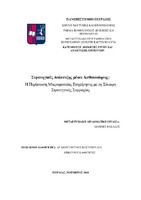Στρατηγικές ανάπτυξης μέσω διεθνοποίησης: η περίπτωση μικρομεσαίας επιχείρησης με τη σύναψη στρατηγικής συμμαχίας

Προβολή/
Λέξεις κλειδιά
Διεθνοποίηση ; Στρατηγικές ανάπτυξης ; Στρατηγική διεθνοποίησης ; Μικρομεσαίες επιχειρήσεις ; Οικογενειακές επιχειρήσεις ; Σύναψη στρατηγικής συμμαχίας ; Διοίκηση έργου ; Ανάπτυξη προϊόντωνΠερίληψη
Κάθε επιχείρηση δραστηριοποιείται στην παγκόσμια οικονομία, που αυτό στην ουσία σημαίνει υιοθέτηση στρατηγικών που δίνουν την δυνατότητα και στους επιχειρηματίες των οικογενειακών Μ.Μ.Ε. να αυξήσουν τις ευκαιρίες. Η στρατηγική διεθνοποίησης μέσω σύναψης στρατηγικών συμμαχιών είναι μία από τις μεθόδους ανάπτυξης που επιλέγεται από τους επιχειρηματίες, αλλά και στην συγκεκριμένη υπό μελέτη περίπτωση από την υπό εξέταση εταιρία, Παπανάρετος Α.Ε., καθώς είναι μία στρατηγική που υπάρχει καταμερισμός του ρίσκου και του κόστους από δύο ή και περισσότερες εταιρίες που συνεργάζονται. Στόχος της εργασίας είναι η βιβλιογραφική έρευνα γύρω από τις συγκεκριμένες στρατηγικές και η σύγκριση των τεχνικών και διαδικασιών που ακολούθησε η εξεταζόμενη εταιρία στην πράξη. Επιπλέον ο εντοπισμός των σημείων προς διόρθωση ή και αλλαγή, αλλά και η εξαγωγή συμπερασμάτων που θα μπορούσαν να βοηθήσουν σε υπόλοιπες μελέτες. Για τον παραπάνω σκοπό, πραγματοποιήθηκαν συνεντεύξεις και συμπληρώθηκαν ερωτηματολόγια ανοιχτού τύπου από τους υπεύθυνους των τμημάτων της εταιρίας, αλλά και τον διευθύνοντα σύμβουλο, οι οποίοι ασχολούνται με την εξαγωγική δραστηριότητα και συνεργάζονται με συναδέλφους από την συμμαχική εταιρία. Παρουσιάζονται οι λόγοι για τους οποίους πραγματοποιήθηκε η συμμαχία, που ήταν οι συμπληρωματικές ικανότητες που είχε η Παπανάρετος Α.Ε. με την εταιρία – σύμμαχο, η πρώτη στην παραγωγή του προϊόντος και η δεύτερη στο Marketing και τις πωλήσεις, αλλά και το κοινό όραμα που είχαν οι δύο εταιρίας για την διεθνοποίησή τους σε νέες αγορές με νέα προϊόντα. Η κάθετη συμπληρωματική συμμαχία που δημιουργήθηκε έχει σαν αποτέλεσμα να συνδυάζουν οι δύο εταιρίες κάποιους από τους πόρους τους για να δημιουργήσουν προστιθέμενη αξία σε διαφορετικά κομμάτια της Αλυσίδας Αξίας. Τα εμπόδια στην έναρξη της συμμαχίας ήταν κυρίως η επικοινωνία, η οποία έπρεπε να γίνει σε γλώσσα που δεν ομιλείται στην καθημερινότητα των δύο εταιριών αλλά και η εμπιστοσύνη μεταξύ τους. Η διοίκηση της συμμαχίας πραγματοποιείται από τους δύο διευθύνοντες συμβούλους και δημιουργούνται οριζόντια κανάλια επικοινωνίας και συνεργασίας σε όλα τα επίπεδα της ιεραρχίας των δύο συμμαχικών εταιριών. Οι όροι και οι ευθύνες δεν ορίστηκαν απόλυτα από την αρχή της σύμπραξης και έτσι δημιουργήθηκαν παρανοήσεις και σύγχυση, τα οποία όμως ξεπεράστηκαν με συνεννόηση και συνεργασία από τις δύο πλευρές. Όσον αφορά στα διαφορετικά τμήματα της εταιρίας που συνεργάζονται για την πραγματοποίηση των εξαγωγών, κάποια τμήματα (RnD, Ποιότητα, Logistics) επηρεάστηκαν αρκετά από την στρατηγική συμμαχία και άλλα (Παραγωγή και το Λογιστήριο) επηρεάστηκαν μόνο στην αρχή αλλά στην συνέχεια προσαρμόστηκαν και πάλι. Τέλος, τα τμήματα (Logistics, Ποιότητα) που έχουν συχνή επαφή με συναδέλφους τους της συμμαχικής εταιρίας αλλά και το αντικείμενό τους είναι δυναμικό και προϋποθέτει διαρκή ενημέρωση γύρω από τις εξαγωγές, είναι τα τμήματα που θα θεωρούσαν απαραίτητη την αποκλειστική ασχολία κάποιων εργαζομένων με το κομμάτι των εξαγωγών.


